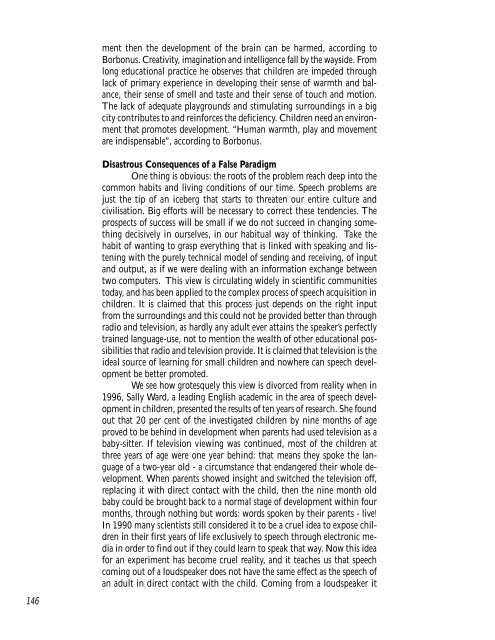Colloquium on English - Research Institute for Waldorf Education
Colloquium on English - Research Institute for Waldorf Education
Colloquium on English - Research Institute for Waldorf Education
You also want an ePaper? Increase the reach of your titles
YUMPU automatically turns print PDFs into web optimized ePapers that Google loves.
146<br />
ment then the development of the brain can be harmed, according to<br />
Borb<strong>on</strong>us. Creativity, imaginati<strong>on</strong> and intelligence fall by the wayside. From<br />
l<strong>on</strong>g educati<strong>on</strong>al practice he observes that children are impeded through<br />
lack of primary experience in developing their sense of warmth and balance,<br />
their sense of smell and taste and their sense of touch and moti<strong>on</strong>.<br />
The lack of adequate playgrounds and stimulating surroundings in a big<br />
city c<strong>on</strong>tributes to and rein<strong>for</strong>ces the deficiency. Children need an envir<strong>on</strong>ment<br />
that promotes development. “Human warmth, play and movement<br />
are indispensable”, according to Borb<strong>on</strong>us.<br />
Disastrous C<strong>on</strong>sequences of a False Paradigm<br />
One thing is obvious: the roots of the problem reach deep into the<br />
comm<strong>on</strong> habits and living c<strong>on</strong>diti<strong>on</strong>s of our time. Speech problems are<br />
just the tip of an iceberg that starts to threaten our entire culture and<br />
civilisati<strong>on</strong>. Big ef<strong>for</strong>ts will be necessary to correct these tendencies. The<br />
prospects of success will be small if we do not succeed in changing something<br />
decisively in ourselves, in our habitual way of thinking. Take the<br />
habit of wanting to grasp everything that is linked with speaking and listening<br />
with the purely technical model of sending and receiving, of input<br />
and output, as if we were dealing with an in<strong>for</strong>mati<strong>on</strong> exchange between<br />
two computers. This view is circulating widely in scientific communities<br />
today, and has been applied to the complex process of speech acquisiti<strong>on</strong> in<br />
children. It is claimed that this process just depends <strong>on</strong> the right input<br />
from the surroundings and this could not be provided better than through<br />
radio and televisi<strong>on</strong>, as hardly any adult ever attains the speaker’s perfectly<br />
trained language-use, not to menti<strong>on</strong> the wealth of other educati<strong>on</strong>al possibilities<br />
that radio and televisi<strong>on</strong> provide. It is claimed that televisi<strong>on</strong> is the<br />
ideal source of learning <strong>for</strong> small children and nowhere can speech development<br />
be better promoted.<br />
We see how grotesquely this view is divorced from reality when in<br />
1996, Sally Ward, a leading <strong>English</strong> academic in the area of speech development<br />
in children, presented the results of ten years of research. She found<br />
out that 20 per cent of the investigated children by nine m<strong>on</strong>ths of age<br />
proved to be behind in development when parents had used televisi<strong>on</strong> as a<br />
baby-sitter. If televisi<strong>on</strong> viewing was c<strong>on</strong>tinued, most of the children at<br />
three years of age were <strong>on</strong>e year behind: that means they spoke the language<br />
of a two-year old - a circumstance that endangered their whole development.<br />
When parents showed insight and switched the televisi<strong>on</strong> off,<br />
replacing it with direct c<strong>on</strong>tact with the child, then the nine m<strong>on</strong>th old<br />
baby could be brought back to a normal stage of development within four<br />
m<strong>on</strong>ths, through nothing but words: words spoken by their parents - live!<br />
In 1990 many scientists still c<strong>on</strong>sidered it to be a cruel idea to expose children<br />
in their first years of life exclusively to speech through electr<strong>on</strong>ic media<br />
in order to find out if they could learn to speak that way. Now this idea<br />
<strong>for</strong> an experiment has become cruel reality, and it teaches us that speech<br />
coming out of a loudspeaker does not have the same effect as the speech of<br />
an adult in direct c<strong>on</strong>tact with the child. Coming from a loudspeaker it

















